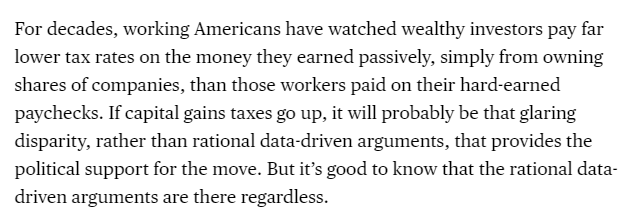
1/Let's have a little chat about capital gains taxes, shall we?
Biden wants to raise capital gains taxes for high-income people. This is a good move.
bloomberg.com/opinion/articl…
Biden wants to raise capital gains taxes for high-income people. This is a good move.
bloomberg.com/opinion/articl…
2/The first good thing about capital gains taxes -- as opposed to corporate taxes or payroll taxes or sales taxes -- is that you can make them very progressive, so they mostly tax high earners.
Biden wants to do exactly this.
Biden wants to do exactly this.
3/The second good thing about capital gains taxes is that they won't throw the country back into recession.
Capital gains taxes are macroeconomically safer than most other kinds of taxes.
Capital gains taxes are macroeconomically safer than most other kinds of taxes.

4/Opponents of capital gains taxes claim that they'll reduce financial investment.
But at a time when people are throwing mountains of cash at Dogecoin, I don't think a scarcity of financial capital is something we need to worry about.
cnbc.com/2021/04/28/dog…
But at a time when people are throwing mountains of cash at Dogecoin, I don't think a scarcity of financial capital is something we need to worry about.
cnbc.com/2021/04/28/dog…
5/People sometimes forget that capital gains taxes give investors a reason not to pull money *out* of the stock market.
This is probably one reason why capital gains tax hikes don't hurt stock prices.
bloomberg.com/opinion/articl…
This is probably one reason why capital gains tax hikes don't hurt stock prices.
bloomberg.com/opinion/articl…
6/And how about the impact on real business investment? There's evidence showing that dividend tax cuts (which are sort of like capital gains tax cuts) don't boost business investment.
eml.berkeley.edu/~yagan/Dividen…
eml.berkeley.edu/~yagan/Dividen…
7/In fact, capital gains taxes could even STABILIZE financial markets by discouraging over-trading, thus making them more attractive places for long-term patient capital to invest. 

8/But capital gains taxes DO raise a lot of revenue.
A recent paper by @NatashaRSarin, @omzidar, et al. shows that these taxes are good at raising money:
nber.org/papers/w28362
A recent paper by @NatashaRSarin, @omzidar, et al. shows that these taxes are good at raising money:
nber.org/papers/w28362
9/And in the end, on top of all these economic benefits, capital gains taxes probably seem very fair to the American people.
Perceptions of fairness matter a lot!
Perceptions of fairness matter a lot!

10/So capital gains taxes have tons of advantages, and few measurable disadvantages.
Seems like a tax we should be using!
(end)
bloomberg.com/opinion/articl…
Seems like a tax we should be using!
(end)
bloomberg.com/opinion/articl…
• • •
Missing some Tweet in this thread? You can try to
force a refresh




